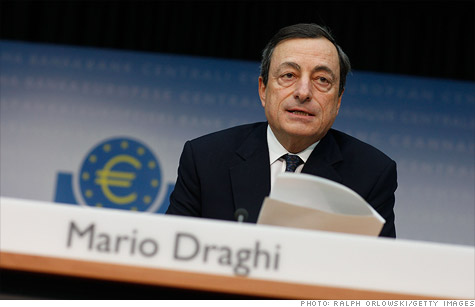
ECB president Mario Draghi at a Nov. 3 press conference after the bank lowered interest rates and warned of a mild recession in Europe.
NEW YORK (CNNMoney) -- The European Central Bank is under pressure to step up its bond-buying program as borrowing costs for Italy rise to dangerously high levels.
But experts say the ECB, which has already bought billions of euros worth of government debt, remains reluctant to ride to the rescue.
Global financial markets rebounded amid speculation the ECB could announce unlimited bond buying at an emergency meeting, even as bank officials sought to tamp down the rumors.
"We've come at the end of what we can do, it's now up to the governments," said Dutch Central Bank president Klaas Knot, according to reports.
ECB officials have said repeatedly that the bond-buying program is a temporary measure to ensure that its monetary policies are effective in an environment where markets are dysfunctional.
Mario Draghi, the former Italian central banker who became ECB president earlier this month, has questioned the reasoning of an open-ended commitment to buy government bonds.
"What makes you think becoming the lender of last resort for governments is actually the thing you need to keep the eurozone together?" Draghi said cryptically in a press conference last week.
But some investors and economists see the ECB as the only European institution with the capacity to respond quickly to the crisis in Italy.
Italy's borrowing costs surged last week, crossing 7% for the first time, as investors lost confidence in the government's ability to enact budget reforms.
Under pressure from other European powers and protesters in Rome, Prime Minister Silvio Berlusconi announced plans to step down.
Yields eased below 7% late Thursday, possibly driven by a round of ECB buying.
Under its Securities Markets Program (SMP), the ECB has bought billions of euros worth of government bonds issued by Italy, Spain and other troubled euro area economies. For Italy, analysts said the unofficial goal was to hold interest rates at 6%.
"We believe that the ECB will meaningfully increase its SMP to the point where Italy may be able to retain market access," analysts at Nomura Securities wrote in research note. "However, we believe that this expansion in the SMP will fall short of what is required to address the debt crisis."
The fear is that Italy will be shut out of the international credit markets and the government will no longer be able to fund its activities. That would put Italy in a situation similar to what Greece, Ireland and Portugal faced before being rescued by fellow European nations.
The problem is that Italy, which has gross debts of about €1.9 trillion, is too expensive to bail out. But as the third-largest euro area economy, Italy is also too big to fail.
The lack of solutions has put the ECB in the uncomfortable position of being seen as a potential lender of last resort for nations that cannot borrow from the private sector.
But many observers say the leadership in Frankfurt remains opposed to expanding the bank's balance sheet with risky sovereign debt.
"I can't imagine that they will step up and say they'll be the lender of last resort," said Natascha Gewaltig, director of European economics for Action Economics. "Any bond buying in the secondary market only glosses over the problems and extends market imbalances."
Gewaltig argues that Italy needs to enact reforms that will boost economic growth, not just cut spending, to stabilize its debts.
Still, other analysts say the ECB may quietly increase its purchases of Italian bonds if the government demonstrates a commitment to getting its fiscal house in order.
"If, and only if, Italy decides to help itself through a swift move towards comprehensive reforms would core Europe and the ECB be more likely to sufficiently flank this process," wrote Frank Engels, analyst at Barclays Capital, in a client note.
In the meantime, the only possible replacement for the ECB remains a work in progress.
The European Financial Stability Facility has the power to intervene in sovereign debt markets, but it needs additional firepower to handle Italy's financing needs.
EU leaders have come up with two plans to leverage the €440 billion fund up to €1 trillion.
Under one method, the fund would partially guarantee losses on new issues of government debt. The other method involves creating a special investment vehicle to attract capital from non-EU government investors.
However, the final terms of those plans are still being determined and the beefed up EFSF is not expected to be operational any time soon. ![]()
| Overnight Avg Rate | Latest | Change | Last Week |
|---|---|---|---|
| 30 yr fixed | 3.80% | 3.88% | |
| 15 yr fixed | 3.20% | 3.23% | |
| 5/1 ARM | 3.84% | 3.88% | |
| 30 yr refi | 3.82% | 3.93% | |
| 15 yr refi | 3.20% | 3.23% |
Today's featured rates: